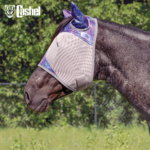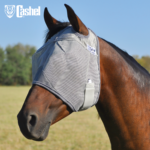Professional reining trainer Dianne Sommerfeld of 3D Performance Horses in Petaluma, Calif., knew one day her champion cutter and reining cow horse stallion Brudder would show signs of wear and tear. His long competitive career surely had caused some joint-related problems, but the heart of this stallion endured until recently, at the amazing age of 31, Dianne started to notice that Brudder was stiff on his hind end. Click here to download a PDF of this article.
 Unless you see a slow-motion video or photograph, it’s easy to overlook the amount of trauma a horse’s joints endure.
Unless you see a slow-motion video or photograph, it’s easy to overlook the amount of trauma a horse’s joints endure.After long conversations about cortisone injections in his hocks and joint supplements, Dianne decided to try a Legend injection. Within days of his injection, Brudder not only began to feel better under saddle, but he also started to act like a young energetic horse again. She was amazed at how this simple monthly injection could make such a positive difference for her horse.
From reining to endurance, dressage to racing, horse owners in every discipline seem to find themselves in situations like Dianne’s, pondering the use of joint supplements.
Two of the most popular injectable joint supplements are Adequan and Legend, and both research and anecdotal evidence suggest that they can help horses with joint-related issues. More than that, they can help slow the onset of arthritis, making them a good preventative measure, as well.

Inflammation Defined
No matter what you do, repeated trauma or stress to the joint during everyday riding, athletic training or performance will result in joint inflammation at some level in your horse. This is the start of “arthritis.”
Inflammation symptoms include:
- Heat
- Pain
- Swelling
- Loss of function.
To counter inflammation, joints try to regenerate the damaged structures, including cartilage. But because cartilage has a poor blood supply, it regenerates slowly. In fact, the rate of degeneration usually exceeds the rate of regeneration. Consequently, cartilage continuously erodes over time, leaving the ends of the bones exposed.
When that happens, bone reacts by adding extra bone, called “bone spurs.” That’s osteoarthritis, or inflammation in a joint with permanent bone remodeling. Once new bone production begins in your horse, it won’t stop.
Can It Be Prevented?
There are thousands of research articles regarding the use of joint supplements in horses, and true to form, many contradict one another. This can make it difficult for an owner to decide whether or not to endure the expense of these products.
However, one universally agreed upon point is this: Joint supplements do far more to prevent inflammation and joint breakdown than they do to treat it once it has started. In other words, don’t wait until your horse has a problem to start using joint supplements.
Joint Stiffness
There are dozens of indicators that a problem has developed, but the most common are:
- Lameness
- Decreased range of motion
- Swelling /excess fluid in a joint
- Pain reaction to flexion tests
- Abnormal joint shape/contour
- Reluctance to perform
- Agitated or unhappy behavior
- Unwillingness to hold a gait (especially cantering)
- Difficult for the farrier.
Signs or no signs, we feel it’s a good idea to give your horse a joint supplement now because it may well prolong the usable life of his joints. They’re expensive, though, and many people need more justification. That’s understandable.
 Radiograph of a horse carpus (knee). Bone spurs can form on the edges of the joint space and cause pain.
Radiograph of a horse carpus (knee). Bone spurs can form on the edges of the joint space and cause pain.What Joint Supplements Do
Think of cartilage like a tree. The roots, trunk and branches can all be represented by hyaluronan, GAGs and chondroitin. However, if a tree falls down (analogous to cartilage being damaged) simply throwing pieces of trees on top of the fallen trunk will not make it regrow. So what are these joint supplements doing?
Joint supplements mainly function as anti-inflammatory agents throughout the body. Since joints in constant use always have some degree of inflammation, it makes sense to give a joint supplement on an ongoing basis to counter the inflammation.
Legend and Adequan
Veterinarians frequently recommend Legend and/or Adequan, possibly because they’re injected into your horse, rather than fed. That means they bypass digestion and absorption and get directly into your horse’s body, making them potentially more effective. They’re also FDA-approved.

Many folks prefer Adequan over Legend because it costs less and is easier to administer. Adequan is polysulfated glycosaminoglycan (PSGAG), which is proven to have an anti-inflammatory effect in the body. It’s a prescription item, administered intramuscularly and usually involves a loading dose regimen initially and then tapers off to one injection per month.
Adequan (seven vials) sells for around $280 or $40 per injection. Chances are you can give it to the horse yourself.
If you consider it at $40/month, it’s relatively low compared to Legend or to most oral supplements. Adequan is safe. Few reactions or side effects have been reported, and horses seem to tolerate the 5cc injection well. It’s legal for most competitions and clients who use it usually report improvements in their horse’s movement and performance within a couple of weeks.
Legend is also a prescription injectable. It consists of 4 ccs of hyaluronan given intravenously. It can be given as a series of loading doses like Adequan, and it eventually will also taper off to one injection per month for most horses.

Because it must be administered intravenously, in most cases, you’ll need a vet to give it. Herein lies one of the challenges.
Legend can be purchased in a six pack, which is competitively priced at around $468 (or $78 per dose). That is almost twice the cost of Adequan and still doesn’t include the costs involved with the vet coming out and giving the injection.
For those who wish to try intravenous injections themselves, there can be serious reactions to Legend if it is accidentally injected into an artery rather than a vein. It’s best given by someone skilled in intravenous injections.
Legend also has an excellent anti-inflammatory effect in the body and is legal for most competitions. Legend works within days of it being given, which makes it a great last-minute choice to help tune a horse up for a show.
The New Guy: Pentosan
We think it’s important to discuss a third injection that is a strong option in the fight against arthrtitis. Pentosan is a nutraceutical with impressive anti-inflammatory properties. It works along the same lines as all of our other joint supplements: It helps to combat inflammation by stopping the release, or preventing the action, of inflammatory mediators.

Some studies have found it to be 10 times as potent as other joint supplements in stopping inflammatory mediator releases. But, you may ask, do these laboratory observations transfer over into the real world and to horses? Yes!
Pentosan is currently approved for use as a post-surgical joint lavage. This means that if a surgeon opens up a joint (arthrotomy), he or she can squirt pentosan all over it just before joint closure. Even though this is the official label use, thousands of veterinarians worldwide use pentosan systemically via intramuscular injection as a general joint supplement. It’s available in the United States by prescription only, and some veterinary distributors (such as MWI, Inc.) will sell it to veterinarians. It is given intramuscularly, usually at the rate of 1 dose per week for four weeks, then backing off to once monthly.
A particularly popular brand of pentosan is PentAussie (www.matrixanimalhealth.com). It’s a good product because it has been cleared for distribution by the Australian equivalent of the FDA, in other words, it is NOT compounded.
PentAussie is also attractive because it comes joined with an injectable form of glucosamine. In essence, you’re getting two joint supplements for the price of one. PentAussie comes in individual 12 cc vials (12cc constitutes one dose) that should range around $60. This puts it between Adequan ($50 per vial) and Legend ($90 per vial).
Overall, both lab research and owner testimonial indicate that pentosan does combat joint inflammation and improve performance. Why the “overall”? Because, just like every other joint supplement on the market, it works better in some horses than in others. But this is more likely a function of the horse it’s given to than the product itself.
If you recall, inflammation is governed by hundreds of chemical mediators. The drug Legend may knock out some of them, and Adequan may take care of others, while pentosan has an affinity for a different group.
The ability of any given joint supplement to work depends largely on whether or not the inflammation the horse is experiencing is mediated by the particular set of inflammatory mediators that the supplement targets. Of course, dose amount and frequency also influence an injectable joint supplement’s ability to show results in a sore horse.

Bottom Line
Do your homework to determine whether or not the pentosan that you are using is compounded or “approved.” Beware of the dangers of compounded medications, especially injectable ones! The risk is to high, in our opinion.
Pentosan may work in your horse (depending on the chemical mediators that predominate his inflammation) and is worth a shot if you are experiencing ongoing lameness or performance issues that would require a joint supplement. You may also want to consider switching to it if you are getting lackluster results with your current joint supplement.
It’s available by prescription, so consult your veterinarian to see if it is the right fit for your horse.
You can feel confident using pentosan, Legend or Adequan, although we’ve seen slightly more noticeable results with Legend. Some research indicates that the two given in conjunction will have a much greater positive effect in your horse than if you just used one or the other alone.

Whatever you decide, being proactive about joint supplements appears to be wise. Oral or injected, joint supplements do far more to prevent osteoarthritis than they do to treat it once it has started.
Article by Grant Miller, DVM, Contributing Veterinary Editor





